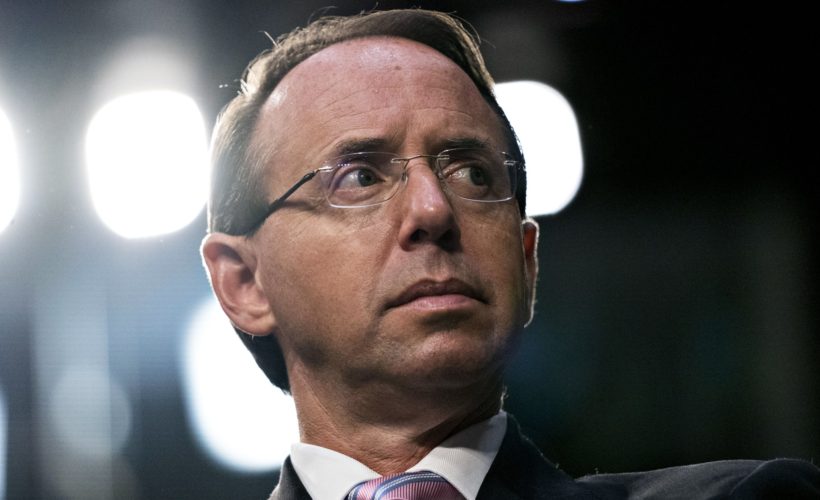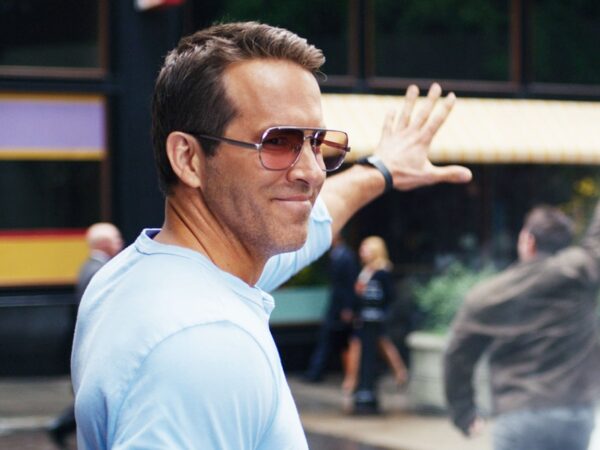What was already setting up to be one of the biggest, most consequential weeks of Trump’s presidency—as the commander-in-chief, in New York, chaired a meeting of the United Nations and, in Washington, the city braced for a showdown over Supreme Court nominee Brett Kavanaugh—saw the stakes appear to rise to historic levels by noon Monday, as news outlets raced to report the long anticipated denouement of deputy attorney general Rod Rosenstein.
It was not to be. But the momentary firing-that-wasn’t likely marks the postponement of an impending crisis, rather than a permanent escape.
The demise of Rod Rosenstein—the man who in his first weeks in office helped justify the firing of FBI Director James Comey and then appointed Comey’s predecessor, Robert Mueller, to be the special counsel leading the investigation into Russia’s attack on the 2016 presidential election—appeared to happen as Ernest Hemingway once said about going bankrupt: Gradually, then suddenly.
Gradually, because ultimately, it has never seemed a question of if Rosenstein would be fired, but when—and how far along Mueller would be by the time Rosenstein was canned. Reporters across the capital had prewritten “Rosenstein is fired” stories numerous times, as the tensions between the White House and the Justice Department ebbed and flowed over the last two years. (Most recently, the Wall Street Journal had actually sung the praises of the Trump-Rosenstein dynamic: “It’s fantastic,” President Trump said of their relationship in August.)
And suddenly, because last Friday, The New York Times reported that Rosenstein had—in those same tumultuous weeks last year following Comey’s firing—discussed possibly invoking the 25th Amendment and rousting Cabinet officials to remove Trump from office. Ironically, the article explained that Rosenstein at the time thought he could enlist then Homeland Security Secretary John Kelly in the effort, who was the man Rosenstein appeared to be meeting with Monday to receive his walking papers.
But as quickly as the “Rosenstein is fired” news spread came just-as-earth-shattering news that Rosenstein would actually stay—at least until Thursday, when he would meet with President Trump in person. The crisis occurred, and passed, in barely the length of a Law & Order episode.
Even so, the life expectancy of the Mueller investigation status quo perhaps already numbers mere weeks; the uneasy and fragile truce that has existed between the Justice Department and the White House since the summer of 2017—where Trump freely berates Mueller on Twitter but stops short of any action that would actively remove him—already seems ready to be upset soon.
Trump, it appears, is already making noise about breaking the truce, even if Rosenstein survives.
Rosenstein’s ouster has long been seen in Washington as Act One of Trump’s own Saturday Night Massacre: Trump would fire Rosenstein, then Mueller himself, along with perhaps any other Justice Department official who stood in the way of upending the special counsel. American democracy at that point would be tested like never before, the thinking went, as the central premise of the United States, as a nation of laws, not men, was stressed by a president who has happily (and grumpily, on occasion) trampled past every norm of democracy.
Rosenstein himself has hung on longer than almost anyone has anticipated, facing months of withering attacks from Trump-backing media outlets like Fox News and assaults from the presidential Twitter account that would have felled any other public servant in more normal times. It is a testament in some ways to the political acumen that had allowed him, at the time of his appointment to the Justice Department’s #2 role, to be the nation’s longest-serving US Attorney, spanning the presidencies of George W. Bush, Barack Obama, and Donald Trump.
He has also survived where so many others have not. The toll of the Russia investigation and Trump’s administration-long tussle with the Justice Department and the rule of law has already claimed a high body count: First, there was acting attorney general Sally Yates, then FBI Director Jim Comey, then FBI General Counsel James Baker, then FBI Chief of Staff Jim Rybicki, then FBI Deputy Director Andrew McCabe.
Rosenstein has been carefully updated by Mueller throughout the investigation, and has been the public face of the only two press conferences held since the case began, the announcements of the charges against the Russian Internet Agency, in February, and the charges against Russian GRU intelligence officers, in July.
His visibility into the case—and his role in the original sin of the Comey firing—made him, as I wrote earlier in the summer, the most beguiling figure of the Russia investigation: “In a world of hedgehogs and foxes, Rosenstein today is the ultimate hedgehog. Rosenstein knows one very big, monumental, history-shaping thing—how Trump’s presidency will end—and he’s wagered that if he can hang on long enough, justice will be done and the good guys, in his eyes, will win. His early actions, around Comey’s firing, will be vindicated by history when seen by the light of his bravery and personal sacrifice and refusal to be bullied into quitting, a move that would almost surely lead to Mueller’s investigation being shut down or circumscribed by whichever Trump appointee takes over supervising it next.”
Yet, even as Washington returned to normal Monday, the political landscape still seems more uncertain than certain.
Rumors have swirled—and President Trump has even widely signaled—that he intends to fire attorney general Jeff Sessions soon after the midterm elections in early November.
Firing Sessions would likely have the same effect as firing Rosenstein himself; the only reason that Rosenstein oversees the Russia investigation in the first place is that Sessions recused himself amid the many questions about his own role in meeting with Russian officials during the Trump campaign. A new attorney general—or a new acting attorney general, if Trump appointed one—would almost certainly take back control of the investigation from Rosenstein.
But what would happen if someone other than Rosenstein oversaw Mueller’s probe? Trump’s lawyers were quick Monday to call for a “pause” in the investigation the moment someone new is appointed to oversee it. Mueller, though, appears to be entering some phase of his probe, as he moves forward with a guilty plea and cooperation from Paul Manafort, and toward “sentencing” one-time national security advisor Michael Flynn. One of the biggest unanswered questions is how much further does Mueller move, publicly or privately, between now and the midterms? Much of Mueller’s grand jury work this month has appeared to “focus narrowly” on Trump associate Roger Stone. Will Stone fall before Sessions is fired?
Mueller’s investigation may also prove harder to shut down, both practically and politically, than it might have during previous presidential eruptions over the so-called “Witch Hunt.” For one thing, parts of Mueller’s investigation have been farmed out to other sets of prosecutors. The elite federal prosecutors of the Southern District of New York are overseeing both the Michael Cohen end of the investigation and allegations against other lobbyists tied to Paul Manafort, like Democratic power broker Greg Craig. And the indictment of GRU officers has been handed off to the Justice Department’s National Security Division.
As former Southern District of New York US attorney Preet Bharara—himself one of the many US Attorneys fired by Trump in a single swoop last year—tweeted recently: “Practice note: Trump has no effective way to shut down any investigation being conducted by SDNY. That office is more insulated, enduring and ‘sovereign’ than the Special Counsel’s Office. You can fire Mueller. You can fire the US Attorney. You can’t fire the SDNY.”
At the same time, the potential cooperation of Paul Manafort also appears to change the equation for President Trump in attempting to fire Mueller or curtail his probe. Now that his campaign chairman is publicly cooperating, any attempt to fire Mueller might be all but prima facie evidence of an attempt to obstruct justice—adding fodder to the very case Trump is trying hardest to evade.
If Rosenstein departs at some point before Sessions does—and there’s no real reason to believe that Thursday’s meeting with Trump will be anything more than a ritual grovel to allow both sides to declare the air cleared—it’s also not immediately clear that the man then next in line to supervise the investigation—Noel Francisco, the Justice Department’s solicitor general—would immediately act to fire or curtail Mueller himself. Francisco, a noted and respected conservative appellate lawyer, has previously expressed views that would seem to make him hostile to the idea of a special counsel, but he also has a largely traditional Washington resume: He worked in the high levels of the George W. Bush White House, and has known the professional reputations of many of today’s central Russia probe figures dating back at least to his days at the Justice Department’s Office of Legal Counsel during the same years where James Comey was deputy attorney general, Christopher Wray was assistant attorney general for the criminal division, and Robert Mueller was FBI director.
For now, though, everything’s the same as it was. And Tuesday begins in Washington, Robert Mueller continues his work. Only he and Rosenstein know what comes next.
Garrett M. Graff is a contributing editor for WIRED and the author of The Threat Matrix: Inside Robert Mueller’s FBI. He can be reached at [email protected].
More Great WIRED Stories
- The disastrous science behind disaster preparedness
- A decade-old attack can break the encryption of most PCs
- The intricate insanity of riding a bike at 184 mph
- PHOTOS: Icelandic landscapes as you’ve never seen them
- We gotta get a better battery. But how?
- Get even more of our inside scoops with our weekly Backchannel newsletter
Source:WIRED











